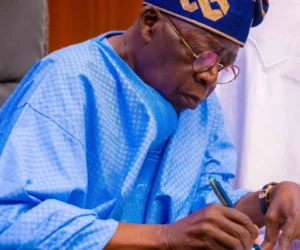Key government agencies, private-sector operators, development partners, and climate advocates on Wednesday gathered in Abuja to push for urgent policy, financing, and technical reforms needed to scale Nigeria’s electric vehicle (EV) charging infrastructure.
These were the crux of discussions at the EV Stakeholders’ Roundtable Dialogue, organised by Clean Technology Hub in collaboration with the Abuja Chamber of Commerce and Industry (ACCI) and Surge Africa. The event marked a significant step toward aligning national efforts for a coherent and investable EV ecosystem.
Speaking at the event, Daramfon Bassey, head of Energy Access at Clean Technology Hub, said Nigeria’s EV charging landscape remains fragmented and largely at a pilot stage, despite growing interest in electric mobility.
He noted that the transport sector now accounts for more than half of Nigeria’s energy-related emissions, underscoring the urgency of developing a reliable charging network to support the country’s energy transition.
Bassey said the proposed Electric Vehicle Transition and Green Mobility Bill offers a promising framework but requires realistic implementation pathways to ensure investor confidence. He maintained that charging infrastructure—not vehicle deployment—will determine the pace and inclusiveness of Nigeria’s EV adoption.
According to him, Nigeria must adopt solutions tailored to its unique challenges, including grid unreliability, rapid urbanisation, limited electricity access, high capital costs, and FX volatility.
He added that the country’s strong solar potential, expanding mini-grid network, large two-wheeler market, and emerging local EV manufacturers present opportunities for decentralised and renewable-powered charging solutions.
The roundtable centred on three priority areas: policy reforms needed to unlock private investment; viable financing and business models suitable for Nigeria’s economic climate; and technical and institutional structures required to guide nationwide charging infrastructure development.
The National Environmental Standards and Regulations Enforcement Agency (NESREA) highlighted the critical role of environmental governance in the EV transition.
Innocent Bariate Barikor, director general of the agency, represented by Chukwura Nnandi-Okaybue said electric mobility aligns directly with national priorities on emissions reduction, public health, and industrial competitiveness.
Barikor said NESREA will enforce strict environmental standards for charging stations, covering land use, electrical safety, electromagnetic field exposure, noise levels, and monitoring.
He added that the Agency is fully implementing the National Environmental (Battery Control) Regulations and the Extended Producer Responsibility (EPR) framework to ensure proper battery storage, recycling, and environmentally sound disposal.
He stressed that Nigeria will avoid the environmental risks associated with informal battery waste handling.
He also noted that NESREA is collaborating with NADDC, the Energy Transition Office, Standards Organisation of Nigeria, Nigeria Customs Service, and state environmental authorities to harmonise standards and close regulatory gaps in the EV sector.
Similarly, a goodwill message delivered by Joan Bishop, Network Co-ordinator, Youth Climate Collective, an initiative of Surge Africa, emphasised the importance of youth engagement in advancing Nigeria’s clean-mobility agenda.
Read also: FG vows support for local assemblers, EV infrastructure
She said the discussions support Surge Africa’s #DriveTheFuture campaign, which promotes clean, accessible and modern transport systems.
Participants at the roundtable committed to developing concrete recommendations, including a realistic 5–10-year roadmap for EV charging deployment, strengthened policy and regulatory frameworks, and practical financing models tailored to Nigeria’s conditions.
Stakeholders also pledged to deepen collaboration to move the country’s EV development from concept to implementation.
The dialogue represents one of the most coordinated efforts yet to establish a unified direction for Nigeria’s EV charging network as the nation seeks to position itself as a regional leader in clean mobility while addressing its environmental and energy challenges.








